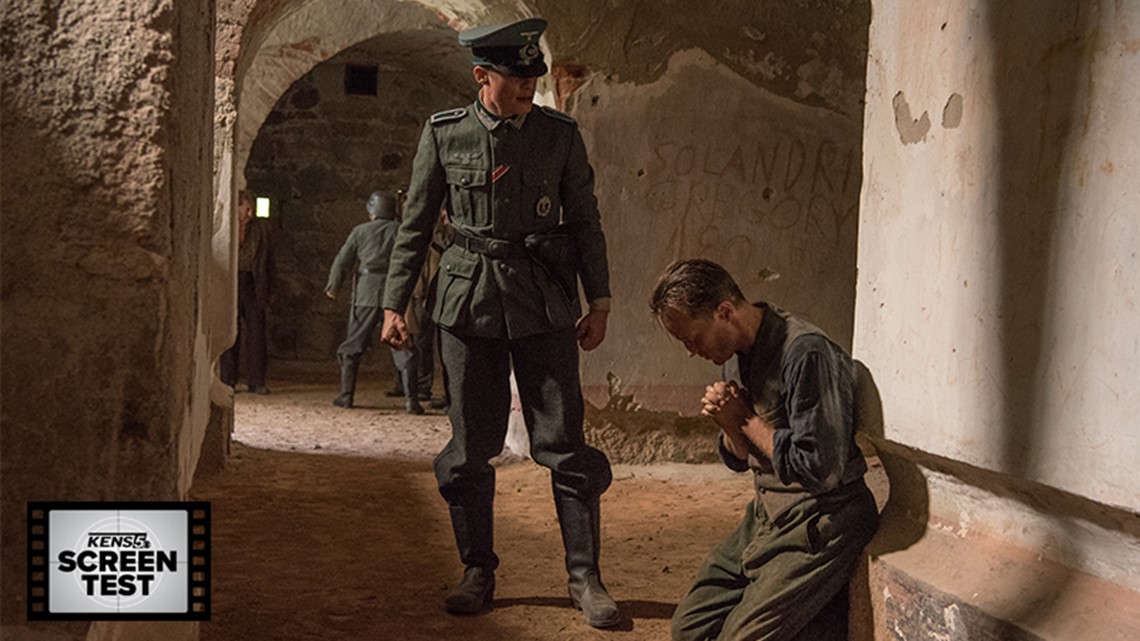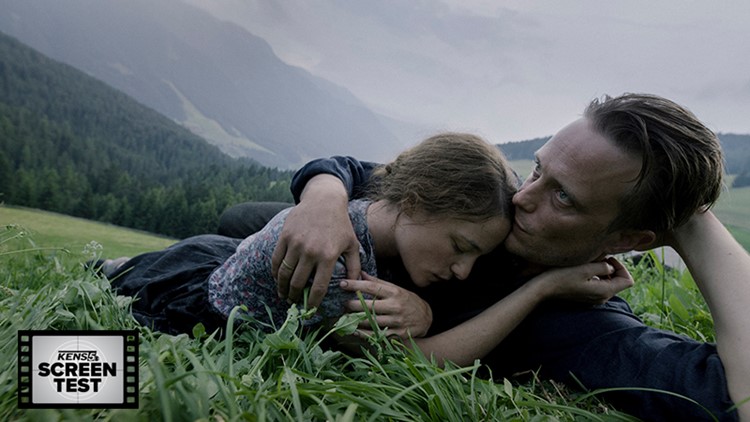Although “A Hidden Life” takes place in early-1940s Austria – an era of hell on earth for much of Europe – the sound to be wary of in director Terrence Malick’s latest film isn’t sirens signaling an incoming blitzkrieg, but the chirp of a bell. A bike-riding messenger makes increasingly regular visits to the idyllic mountain valley village that is home to August Diehl’s Franz Jägerstätter, who exchanges concerned looks with his wife, Franziska. They’re awaiting the inevitable, and the day they’re dreading eventually arrives: There’s a message for him. It’s time to march for Hitler.
But he’s concrete in his resolve to abstain, even through arrest, imprisonment and abuse. The idea of being on the frontlines doesn’t frighten him; rather, he refuses to swear loyalty to nationalistic attitudes that have begun to invade the consciences of the other farmers he has worked, drank and lived alongside all his life. Exercising free will, Franz insists, has to be more than swearing blind allegiance. For him, that extends to challenging it.
With “A Hidden Life,” Malick has his most exceptional work in years, even as his devotion to impressionistic storytelling increasingly goes against the grain of cinema on the cusp of a new decade. Set to release in late December, this may very well be the last film of the 2010s worthy of the term “profound.” It’s a different kind of war epic (clocking in at nearly three hours, it’s the director’s longest movie in 21 years), one in which ideologies are the artillery, perseverance the battle strategy and victory achieved through martyrdom in the dark.
And like Malick’s previous works, “A Hidden Life” is slow-drip cinema. That massive runtime? There’s a version of this movie that’s 130 minutes and which retains its fairly simple narrative. But I imagine an annotated edition of “A Hidden Life” would lose much of its impact, which the writer-director creates through long stretches of wordless imagery, mosaics of everyday life in the village where Franz’s family – including his three daughters and his wife’s sister – lives and works. We’re made privy to the family at play and at work; chasing each other around endless fields and cutting crops with the metronomic, strangely-soothing swinging of a scythe.


In a year when various think pieces and blog posts have questioned the massive lengths of auteurist works, Malick’s insistence on drawing out scenes as long as he can is both a middle finger and an exercise is transcending mundanity to find something that is timeless in nature.
The conflicts that drive war and wartime movies are by and large political squabbles, but the core of “A Hidden Life” – what drives Franz to lead a hidden, decidedly unglamorous last few months of life as a conscientious objector – is spiritual, from the gospel-inspired soundtrack to the regal way the camera gazes up toward painted church ceilings and, later, through the bars of prison cells as if toward God himself. Franz is never conflicted about where he stands on the war, nor is Franziska, but they increasingly find themselves at odds with those around them on the matter. Exploring different perspectives is more important than plot in “A Hidden Life,” with exposition coming by way of verbose philosophical monologues, conversations between Franz and those around him – including a local priest who insists that to serve Hitler is to serve God – and, later, letters between husband and wife when the former is imprisoned. Malick’s first loyalty, as always, isn’t the audience, but to his characters searching for answers. “What’s happened to our country?” Franz asks himself. Mayhaps some of us have had the same questions. A core quandary in Malick’s screenplay is the reconciliation between duty to country and duty to those in power, as well as when – or if – moral righteousness supersedes duty and becomes pride.
Meanwhile, Malick is able to carve out pathos by focusing on the relationship between husband and wife, finding a way to harmonize Franz’s virtue-challenging activism with the longing between man and woman. Diehl and Valerie Pachner perform in their roles to understated effect, with a subtle emotional tension rippling underneath. When anguish does occasionally break the surface of steadfast resolve, it’s deeply felt—after all, a few words from the lips of Franz are all that is needed to bring him home, even as he’s eventually put on trial for not uttering them.
There is irony in the fact that the more Franz’s attorney and Nazi officers insist that his reluctance to pledge loyalty to Hitler won’t change the course of history, the more they act as if it will. His fight isn’t against opposing troops—it’s against the people of his own country. But is a country only worth as much as its people, and the ideologies influencing their maneuvers? The themes and questions of “A Hidden Life” are more reminiscent of contemporary tensions than I imagine most viewers may expect, and help make Malick’s movie an incredible artifact.
Jörg Widmer, meanwhile, creates magic from behind the camera, capturing with serene beauty a place seemingly cut off from a world at war with sweeping vistas of hills hidden in fog, and more intimate scenes of isolated family life. With Franz’s family, the camera skitters and lurks, never too far from the actors and sometimes getting so close to them that their faces are cut off by the frame, as if welcoming us to rummage through their thoughts and fears. It’s immersive and intrusive, with juxtaposing black-and-white images of Hitler’s armies occasionally (and jarringly) shrinking the scene and creating a surreal quality in contrast.
Individual scenes have a tendency to bleed into the next, linked by rambling theologically-inclined prose intended to envelop the audience in a sensation of swirling dread, even as the pulse of the filmmaking itself rarely quickens beyond the slow beat of unfolding history. There’s nothing in “A Hidden Life” that constitutes narrative liberty or surprise—Diehl may have portrayed a stern Nazi in Quentin Tarantino’s history-bending “Inglourious Basterds,” but Malick isn’t looking to present catharsis by twisting the facts like his contemporary.
On the contrary, “A Hidden Life” would make an excellent (if grim, and very long) double-feature with Martin Scorsese’s recently released “The Irishman”; both films examine, to different yet equally monumental ends, the result of how one chooses to live their life; how passivity mirrors intention; and how our devotion to faith influences our eventual legacies.
"A Hidden Life" opens in San Antonio on Friday, and it's rated PG-13 for thematic material including violent images.
Starring: August Diehl, Valerie Pachner, Maria Simon, Karin, Neuhauser
Directed by Terrence Malick
2019
OTHER SCREEN TEST REVIEWS:
- 'Bombshell' Review: Kidman, Theron, Robbie fuel chronicle of pre-#MeToo empowerment that transcends its Fox News-prodding
- 'Marriage Story' Review: A complex portrait of love at the end, and one of the year's best movies
- 'I Lost My Body' Review: Severed limbs, severed connections
- Movies in the 2010s largely captured, and warned of, our moments of reckoning



